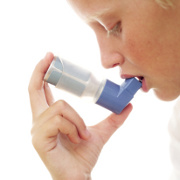 Photo: Getty Images
Photo: Getty Images
For families of children with asthma, the cost of medications to treat asthma symptoms may seem excessive. Children may need multiple medications including controller drugs and rescue inhalers as well as equipment to measure oxygen levels. Extra trips to the doctor can put an additional strain on family resources. But a recent study at National Jewish Health shows that not keeping a child’s asthma under control can be costly both in dollars and in academic achievement.
Asthma is the most common chronic childhood disease, affecting nearly 9 million children in the United States. (National Institute of Allergy and Infectious Diseases) People with asthma can have periods with relatively normal breathing. During an asthma attack, breathing can become difficult as airways are clogged by excess mucus and inflammation of the tissue. A severe asthma attack can prevent air from moving in and out of the lungs and may require immediate medical treatment.
There is no cure for asthma, but there are medications available to help keep symptoms under control and minimize asthma attacks. Control medications may be taken as pills or inhaled. These medications need to be taken on a regular schedule to keep symptoms from appearing. Rescue medications such as inhalers help reduce inflammation during an attack to get air moving.
Researchers at National Jewish Health studied 628 children with asthma that was considered difficult to treat. They tracked costs for three groups of children – those with well controlled, not well controlled, and poorly controlled asthma. At the beginning of the study (2002), they noted these baseline expenses:
• Poorly controlled - $7,846
• Not well controlled - $3,526
• Well controlled - $3,766
Two years later costs for poorly controlled patients had increased, while well controlled costs had dropped:
• Poorly controlled - $8,880
• Well controlled - $1,861
The researchers also noted that the direct costs of care were approximately 50 percent higher for patients with poorly controlled asthma compared to the other two groups.
There were also significant differences in indirect costs, including the cost of having one parent miss work to stay home with a sick child. Children with asthma that was not well controlled missed an average of two days of school, while children with poorly controlled asthma missed an average of 18 days. Children whose asthma was well controlled did not miss any days of school due to asthma symptoms.
In addition to the extra family expense of caring for a sick child, the children with poorly controlled asthma were at greater risk of problems in school due to excessive absences. The researchers referenced a study in Missouri showing that students who miss more than 12 days of school have a much greater risk if failure.
The research team concluded that keeping children’s asthma under control can improve health and reduce medical expenses. Stanley Szefler, MD, lead author and Professor of Pediatrics at National Jewish Health said, “There are effective strategies to improve asthma control among children. By addressing medication adherence, inhaler technique, proper medications, and other asthma management strategies, we could improve asthma and reduce costs significantly."
This is the first study to look at how costs are impacted by the effectiveness of asthma care in children.
Sources:
ScienceDaily. Poorly Controlled Asthma Costly, Study Finds. Web. August 8, 2011.
http://www.sciencedaily.com/releases/2011/08/110804133608.htm
National Institute of Allergy and Infectious Diseases. A Potential new Target for treating Asthma. Web. August 8, 2011.
http://www.niaid.nih.gov/topics/asthma/research/Pages/treatingAsthma.aspx
Asthma and Allergy Foundation of America. Childhood Asthma. Web. August 8, 2011.
http://www.aafa.org/display.cfm?id=8&sub=16&cont=44
Reviewed August 9, 2011
by Michele Blacksberg R.N.
Edited by Jody Smith






Add a CommentComments
There are no comments yet. Be the first one and get the conversation started!